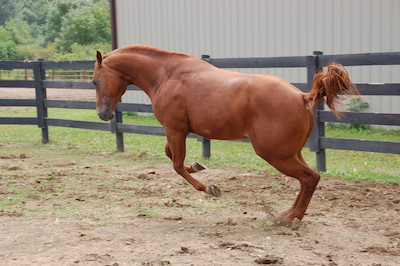“Hi Stacy, Do you have any specific tips and/or tricks regarding reconditioning older horses that have been turned out for a long while? (well, horse AND rider have been out a while.) Regular care and maintenance, just minus the training for past couple of years. Good foundation training before that, (WP & Reining) just back to the drawing board for getting them legged up again and in a routine safely and without too much fuss, hopefully. Thanks. Hope things are going wonderfully in Texas! Blessings to you and your family.”
My biggest tip would be; don’t go too fast. When horses are already broke to ride it is easier to go too fast because the ‘training’ is still in their heads…even if their bodies are out of shape. If a person was a well trained ballerina but took two years off their ‘training’ would still be there but their bodies; muscles, tendons, etc would need time to build back up.
I am tempted to say ‘listen to your horse’ and for the most part that is true but sometimes horses can make mistakes.
- Don’t let them over-do-it
- Don’t ask them to over-do-it
The first few times you take them out the horse could be so excited that he will over-do things because of excitement. My horse Popcorn for example will run himself to the point of injury in the spring the first time he is turned out in a large pasture or area. Logic says he should stop before injury but he doesn’t. To prevent this I make sure he has had some controlled work before I turn him out…he still runs but not quite as much.
In training that means that you should regulate the workout, even if that means just groundwork, for the first few sessions. After the excitement phase wears off, which can be 10 minutes for some horses or 10 days for Popcorn….then you should listen to the horse.
Listen to them means that if they seem tired, grumpy, excited or fresh then the rides should be tailored to this. Remember what it is like to try to get into shape. If you cannot remember then take up running, swimming or bike riding for a couple of months to ‘remember’ what it feels like.
I like to use the breathing rate as a guide to how hard I am working my horse. A very out of shape horse will breathe hard without doing a lot of physical work. As the horse gets fit he will not breath as hard during the same work and he will recover quicker.
3 Comments
Leave a Comment

FREE PDF DOWNLOAD
WHY IS MY HORSE...?
100% Private - 0% Spam
No one taught you the skills you need to work through these things.
Riders often encounter self-doubt, fear, anxiety, frustration, and other challenging emotions at the barn. The emotions coursing through your body can add clarity, or can make your cues indistinguishable for your horse.
Learning these skills and begin communicating clearly with your horse.
Click here to learn more.


I have a 23 yr old that we just ride off and on for a few min. but he is just as fiesty as a 2 year old. so he is hard to tell what he is doing. we don’t work him hard but he loves to go out. He was diagnosed with cancer this year so he will be just doing a parade in June. He has had a hard life and many problems so I don’t know really what to do for him. I really think he loves to go for a ride, but he is a unemotional horse. Im just going to do what I can. any suggestions?
Sometimes I have to remember that when I haven’t ridden my horse for a while and then I expect him to do a 3 hour trail ride, he might not be quite fit enough – I know I suffer afterwards! My daughters pony was unfit for a while and when riding she would be happy enough for about 20 minutes and then she would try to dump her rider. I’ve found that since her fitness has improved she no longer does that. Poor thing was probably feeling sore and tired.
again as always….. you give the best advice and tips…. always the right scenario for us to compare and understand…. now I think I will go take a jog….. NOT!! LoL